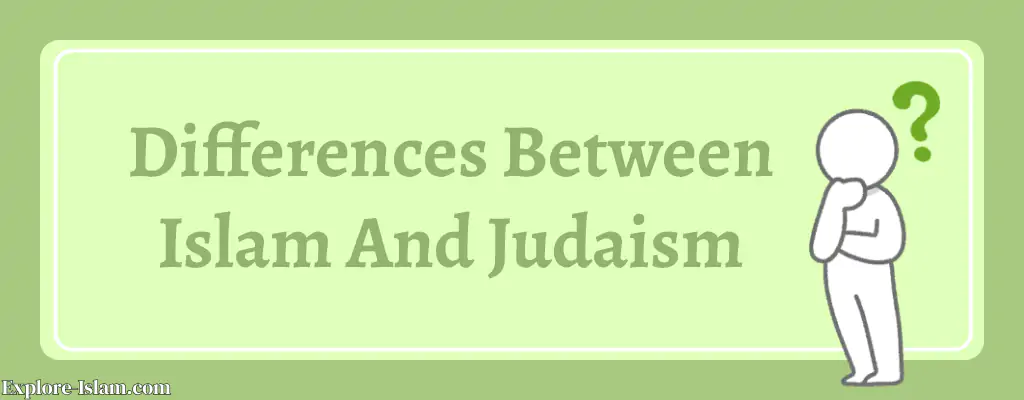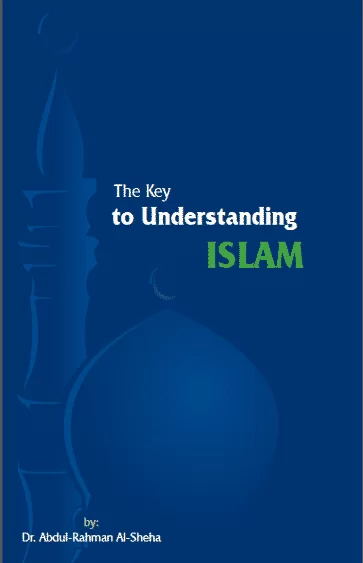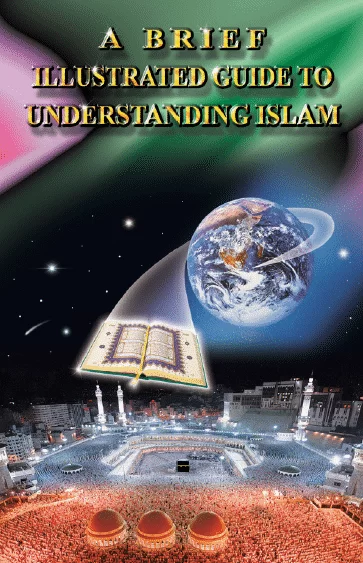Have you ever known that the Hebrew Bible includes prophecies about the coming of Prophet Muhammad (PBUH)? Are you curious to learn about the differences between Islam and Judaism and the reasons behind these differences and even similarities? This article explores key differences between Islam and Judaism, supported by evidence from the Quran and the Old Testament. It also uncovers the reasons behind the similarities and differences between Islam and Judaism.
Belief in Islam necessitates that Muslims believe in all previous scriptures in their original state, as well as all the previous messengers and prophets sent by Almighty God.
For anyone interested in religions, addressing this topic is challenging, yet it is worth the time and effort since it leads to tranquility and eternal happiness. Ready to start a journey of discovering the truth together?
Differences Between Islam And Judaism
Islam and Judaism differ significantly in their depiction of God and His messengers, their views on other nations and women, the preservation of their scriptures, rules of inheritance, and the practicality and applicability of their laws. Let’s explore some key differences:
1. Concept of Almighty God
There is a significant difference in depicting Almighty God’s attributes in the Quran vs the Torah:
God in Judaism:
God is depicted in Judaism in ways that are inappropriate for a perfect God, suggesting human distortion for the Torah. For example:
- God’s Rest After Creation:
“By the seventh day, God had finished the work He had been doing, so on the seventh day He rested…” (Genesis 2:2). - God’s Regret and Repentance:
“It repented me that I have set up Saul to be king.” (1 Samuel 15:11).
Almighty God in Islam:
The Quran describes God with attributes of perfection, free from human limitations:
- God’s Power Reflected in Creation:
“And verily We created the heavens and the earth, and all that is between them in six periods, and no fatigue touched Us.” (Quran 50:38). - God’s Uniqueness:
“There is nothing like Him. He is the Hearing, the Seeing.” (Quran 42:11).
Thus, the difference between the two descriptions highlights the level of preservation for each book.
2. Descriptions of Prophets in the Quran vs. the Torah
Prophets are represented in Islam as role models while in the Old Testament they have a negative distorted description:
Prophets in Judaism:
The Old Testament attributes inappropriate actions to Prophets, such as:
- Lot committing incest (Genesis 19:30-37).
- Solomon worshiping idols (1 Kings 11:3-5).
- Noah becoming drunk and lying naked (Genesis 9:20-21).
Prophets in Islam:
In contrast, the Quran portrays Prophets as elevated noble persons of morality and faith. For instance:
- Noah is praised (Quran 37:79).
- Abraham is described as kind and penitent (Quran 11:75).
- Lot is commended for his wisdom and righteousness (Quran 21:74).
3. Racism: View Toward Other Nations
While the Jews represented a restricted laws specified for them, Islam welcomes any one to embrace religion in easy steps. Following is the reflection of the principle:
Jewish view to others:
Judaism emphasizes national revelation and considers Jews a “chosen people,” often elevating themselves above others. Non-Jews are seen as inferior, and strict conditions apply for outsiders to embrace Judaism. Following is an example for Jewish laws when dealing with non-Jews:
- Financial Dealings with non-Jews:
The Talmud (Bava Kama 113b) permits keeping lost items belonging to non-Jews, based on the verse “with any lost thing of your brother’s” (Deuteronomy 22:3). - Maimonides’ Commentary on the Law:
In Mishnah Torah, commenting on the validity of the deception of the non-Jews, Maimonides states: “Those who lack human qualities are not truly human.”
How Islam fight racism:
Islam rejects racism, giving no superiority to Arabs or non-Arabs except by righteousness. The Quran declares the shared origin of humanity:
“O humanity! Indeed, We created you from a male and a female, and made you into peoples and tribes so that you may ˹get to˺ know one another. Surely the most noble of you in the sight of Allah is the most righteous among you.”
Deception for non-Muslims is rejected
Islam forbids deception or making injustice for non-muslims. During teh time of Prophet muhammad pbuh, when a muslim steals sonething and accusing a jewish, the quran is revealed to annoince the jewish innocence since it’s based on justiceو as mentioned in verse (4:112).
In short, racism has different view in Islam and Judaism with illustrations on their laws.
4. Approach to Wars
The rules of war are different in Islam and Judaism:
Wars in Judaism:
The Old Testament permits extreme brutality during wars suggesting the human insertion of these laws:
“Then they devoted all in the city to destruction, both men and women, young and old, oxen, sheep, and donkeys, with the edge of the sword.”
(Joshua 6:21).
Wars in Islam:
Islam mandates compassion in warfare, forbidding harm to non-combatants:
“Allah’s Messenger (ﷺ) forbade the killing of women and children.”
[Sahih al-Bukhari 3015].
5. Magical Practices
While magic is rejected in Islam, Judaism kept magical practice enhanced with devils:
Magic in Judaism:
Historical Judaism often embraced magical beliefs, such as Practical Kabbalah, which focuses on the use of magic.
Is Magic allowed in Islam?
Islam condemns magic as disbelief. The Quran criticizes the Jews who abandon scriptures for magic:
“They ˹instead˺ followed the magic promoted by the devils during the reign of Solomon… although their magic could not harm anyone except by Allah’s Will.”
6. Preservation of Scripture
While the Quran is preserved as necessity of the last divine message to humanity, the Torah is distorted after the responsiboity of preservation left to its people:
Is the Torah Distorted?
The Torah has been altered and distorted, as evidenced in:
- Quran declaration: The Quran confirms this distortion: “They distort the Book with their tongues.” (Quran 3:78).
- Negative descriptions for Almighty One God and His Prophets
- Old Testament notice: “The lying pen of the scribes has made it into a lie.” (Jeremiah 8:8).
How Quran preserved
The Quran has been divinely preserved through mainly oral trasnmiossn while written scripture came as a secondary method, with millions of Muslims memorizing the same text.
7. Salvation meaning in Islam and Judaism
The core of salvation is theoretically similar. Yet, the reflective rules differs:
Salvation in Judaism:
While repentance and good deeds play a role, ceremonial acts like Kapparot (transferring sins to a hen) are also practiced.
Salvation in Islam:
Salvation in Islam is based on sincere repentance and self-reformation through good deeds.
8. Saturday vs. Friday Practices
The weekend in Islam and Judaism has different rules and practices:
Saturday in Judaism:
Saturday is the Jewish Sabbath, with strict restrictions often manipulated to bypass rules.
Friday in Islam:
Friday is the day of congregation in Islam, where believers are encouraged to increase acts of worship but are not restricted from daily routines.
9. Inheritance Rules
Inheritance rules in Judaism reflects domination of males while in Islam it’s based on justice offering males and females their allocated shares:
Inheritance in Judaism:
Male heirs dominate inheritance, with the eldest son receiving a double share compared to other male sons. Also, as long as there are male sons, the female daughters and the widow receive nothing.
Inheritance in Islam:
Islam provides detailed and just inheritance laws, granting shares to both men and women, with some cases where women inherit more than men. For example, the following verse has a case of male twice a female, and a another for both sharing the same amount:
“Allah commands you regarding your children: the share of the male will be twice that of the female. If you leave only two ˹or more˺ females, their share is two-thirds of the estate. But if there is only one female, her share will be one-half. Each parent is entitled to one-sixth if you leave offspring.” (Quran 4:11).
10. View on Women in Islam Vs Judaism
The laws of Islam related to women are significantly different from those mentioned in judaism:
Women in Judaism:
During menstruation, women are deemed impure and completely isolated, with restrictions extending to postpartum periods (40 days for boys and 80 days for girls).
Women in Islam:
Islam honors women, permitting normal interaction during menstruation, aside from sexual relations. The Prophet Muhammad exemplified kindness toward his wife during such times. Aishah, Prophet Muhammad’s wife describes this situation saying:
“I would drink when I was menstruating, then hand it to the Prophet, and he would put his mouth where mine had been and drink; and I would eat flesh from a bone when I was menstruating, then hand it to the Prophet, and he would put his mouth where mine had been.” [Sahih Muslim]
By examining these key differences, one can see that Islam provides a more practical, just, and reasonable approach as a divine final law and guidance to humanity.
Why There Are Similarities And Differences Between Islam And Judaism
One can find similarities and differences between Islam and Judaism due to various factors, as outlined below:
Reasons for Similarities Between Islam and Judaism
Islam and Judaism share common beliefs and rituals for the following reasons:
1. Divine Scriptures by the Same Almighty God
Muslims believe that Islam is the final divine message, preceded by many divine books and religions. These divine books share the same core beliefs, such as calling for the worship of one true God, belief in the Day of Judgment, and major acts of worship like prayers and charity. However, every divine version of detailed legislations was suitable for its specific time and people. Since Islam is the final divine message to humanity, Almighty God promised to preserve its book, the Quran, and made it universal and suitable for all people until the end of time. While previous scriptures were altered, they still contain some common hints for truth seekers to guide them to Islam.
2. Old Testament Was Documented After the Emergence of Islam
- Effect of Arabic in Decoding: Written in the 6th century BCE in Hebrew by Ezra, the Old Testament was not originally documented with proper diacritics or oral transmission to preserve the original text. Later, Hebrew disappeared and was replaced by Aramaic. The Jews attempted many times to restore and decode the text but failed due to the lack of necessary linguistic tools. With the spread of Islamic culture and the Arabic language, Jews were finally able to decode the language, guided by Arabic linguistic roots since both Arabic and Hebrew are Semitic languages. This process was led by Jewish scholars Aaron ben Asher and Moshe ben Naphtali.
- Effect of Islam on Rituals: Some Jewish rituals not found in their original scriptures were borrowed from Islamic practices:
- Wudu: The ritual of washing feet before prayers, known as wudu in Islam, was adopted by Jews.
- Ghusl: The practice of bathing (ghusl in Islam) after sexual intercourse was also taken from Islamic tradition. This practice was especially common among Jews living in Muslim countries.
- Facing the Prayer Direction (Qiblah): Originally, Jews only faced the qiblah while standing during prayer, not while sitting. The full practice of facing the qiblah during all prayer positions was adopted from Muslim practices.
Reasons for Differences Between Islam and Judaism
There are significant differences between Islam and Judaism based on the following factors:
1. Distortion
Muslims believe in the original versions of previous divine scriptures but hold that these books were not preserved and were altered. This distortion led to many inaccuracies, such as those highly reflected in negative depiction of Almighty God and His Messengers.
2. Different Scope
Judaism was revealed to a specific group of people at a specific time, with legislations tailored to their circumstances. In contrast, Islam is the final divine revelation meant for all humanity, superseding previous scriptures. True followers of earlier scriptures were urged to follow the last messenger, Muhammad, upon his appearance based on the stated descriptions in their books since this is the only available truth preserved.
Conclusion
To conclude, this article explores the major similarities and differences between Islam and Judaism, supported by quotations from the Quran and the Old Testament. It also highlights the reasons behind these similarities and differences.
While Islam acknowledges Prophet Moses as a great messenger and the Torah as a divine scripture—a fundamental belief in Islamic faith—the current versions of the Torah are believed to be distorted and abrogated by Islam. Islam represents the final version of divine truth, preserved by Almighty God to guide humanity until the end of the world.
Despite the distortion of the previous scriptures, the article highlights some prophecies preserved in the Torah that serve as guidance for truth seekers to follow Islam.
Do you want to learn more about Islam and why it’s the only truth preserved for eternal happiness? Start a conversation with our team right now!























